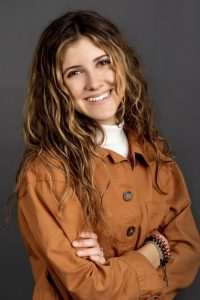Neag School Students Celebrate National School Psychology Week
November 11-15, 2024, marks National School Psychology Week, an annual celebration of school psychologists and the contributions they make to their schools and communities. Often overlooked, school psychologists are uniquely qualified to support students’ ability to learn and teachers’ ability to teach. With a national shortage in the profession, it is also increasingly important to spread awareness.
The Neag School of Education’s Student Affiliates in School Psychology (SASP) have planned activities to recognize the field’s importance. This year’s theme for the week, “Spark Discovery,” emphasizes educating people on how school psychologists help students, families, and communities daily. SASP is a student association of graduate students in educational psychology run through the American Psychological Association (APA) to function as a group for advocacy, event planning, and community building.

Co-presidents Allesandra Bergmark ’27 Ph.D. and Rabbecca Torres ’28 Ph.D. explain that their executive board functions as a cohesive unit to complete planning and projects.
“This is our first year as an association implementing a direct activity in support of students in honor of School Psychology Appreciation Week,” Bergmark says. “We do many activities to support students in general, but this is the first in honor of our appreciation week.”
One of the main ways SASP supported students in the school psychology program this week was through “candy grams,” where older graduate students wrote notes of encouragement to younger students, attached them to candy, and had faculty members give them out. Bergmark emphasizes that these affirmations tell students, “We see you, we hear you,” especially with all the moving pieces that make the field challenging. They are starting small but plan to expand to the undergraduate level to help spread awareness.
They will end the week with a crisis prevention and intervention workshop for students and community members. The aim of the workshop is to promote specific training to help children who may be stuck in difficult situations.
“With the state of our country right now, such as with violence in schools and the mental health crisis, school psychologists are at the forefront of working with kids and the people who work with kids to help combat all of that,” Torres says.
The National Association of School Psychologists divides the field into ten domains that outline how educational psychology services are best integrated to meet the needs of students, families, and the school community. These domains include data-based decision making; consultation and collaboration; academic interventions and instructional supports; mental and behavioral health sciences and interventions; schoolwide practices to promote learning; services to promote safe and supportive schools; family/school/community collaboration; equitable practices for diverse student populations; research and evidence-based practices; and legal/ethical/professional practice.

Torres explains that her pursuit of educational psychology stems from the lack of education and resources in North Shore, Oahu, Hawaii, where she grew up.
“There was a lot I wish I had learned in school,” she says. “Simple things like mindfulness or cognitive behavioral therapy techniques are easy to teach. If I can go and help the kids who were like me, I’ll feel fulfilled.”
Bergmark shares a similar story, where a lot of people she was close to had some form of disability, such as ADHD or autism, that were being underserved in the educational system.
“I’ve became very passionate about bridging this gap between psychology and education,” she says. “Our students spend about 70-80% of their time in school, and they receive about 90% of their mental health support from schools. We, as a field, stress the importance of making sure students receive that direct intervention.”
“Thank you to SASP for helping spread awareness and a big thank you to our students pursuing school psychology; your work does not go unnoticed,” Bergmark and Torres say.
To learn more about the Neag School’s School Psychology program, visit schoolpsych.education.uconn.edu.
Latest UConn Today
- UConn Hosts Sustainability Summit for Northeast Higher EducationConference highlights UConn's sustainability leadership among universities and colleges in the northeast.
- National Impact for CT AHEC and its Urban Service Track/AHEC Scholars from UConn HealthUST/AHEC Scholars alumni from UConn's dental and medical schools present at the National AHEC Organization Conference.
- UConn Magazine: The Good NeighborMichelle (Bussiere) Puzzo ’98 (SAH) is transforming Connecticut communities with a growing business and a simple mantra, “Just help people that say they need help”
- Five UConn Student Teams Innovate Decarbonization This Summer Through Eversource-Supported ChallengeThe winning team will receive additional funding to continue their work throughout the academic year
- Professor John Mathieu to Receive Academy of Management Organizational Behavior Lifetime Achievement AwardMathieu was nominated for the award by a team of former Ph.D. students, who contacted 30 professional acquaintances and asked them to submit recommendations to the 21,000-member Academy. While Mathieu said he is proud to see the impact of his work, he is equally excited to have mentored so many outstanding students.
- Leading with Resilience Personally and ProfessionallyMeet Resilient Administrative Program Coordinator Cassandra Keola of UConn School of Medicine’s Department of Medicine













